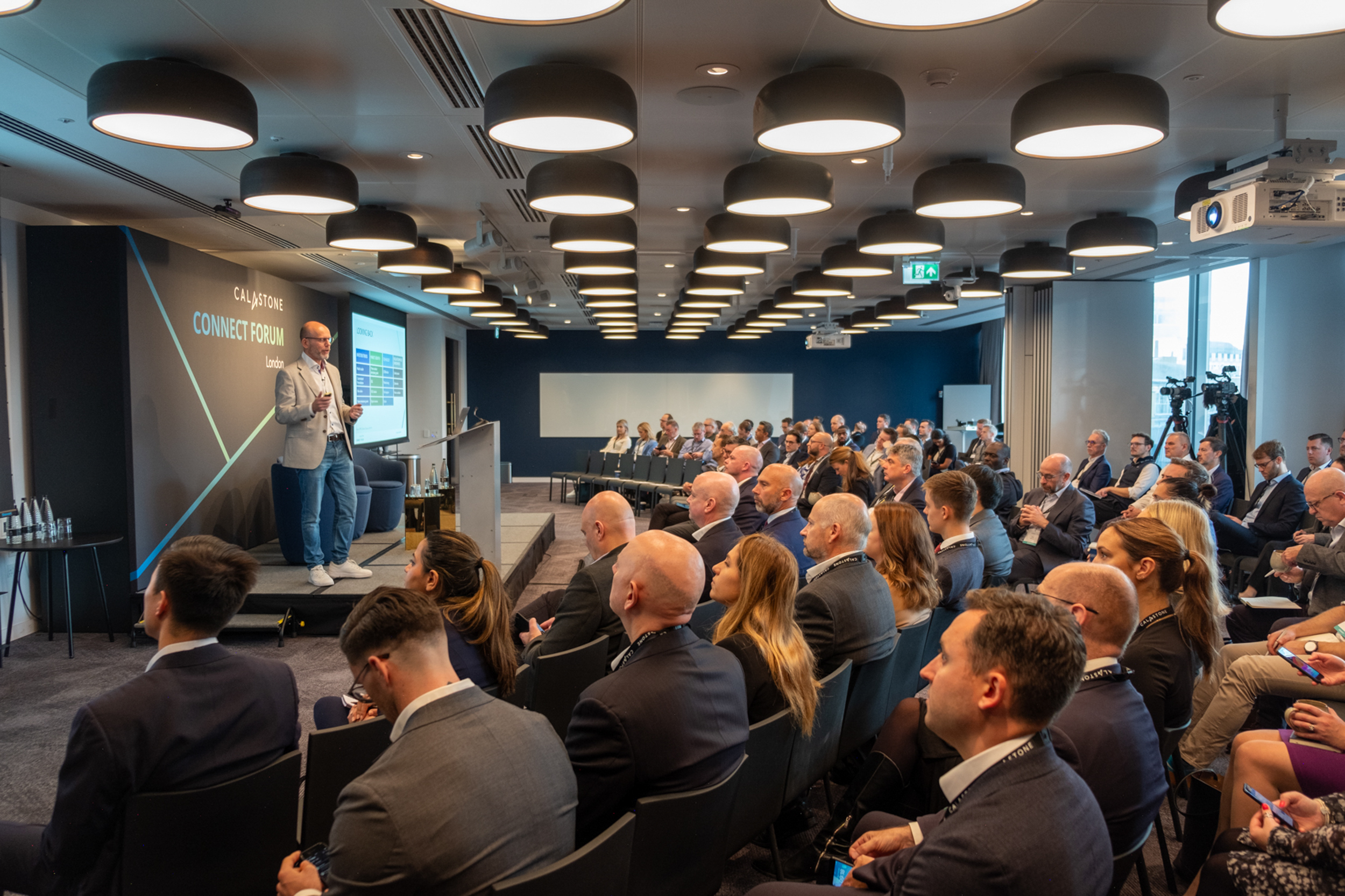Despite the sunshine in Monaco, the mood among asset managers at this year’s Fund Forum was rather gloomy.
Although the funds industry does have some dark clouds hanging over it, with AUM dropping and costs rising, we believe there are reasons to be optimistic about its future. We spoke on a number of panels at Fund Forum, where leading experts explained how asset managers can overcome these issues by embracing digitalisation and diversification.
Tokenisation strikes a chord
Tokenisation – as a concept – is gaining traction in asset management circles, as it could sweep away many of the manual and inefficient processes which are synonymous with the buying and selling of mutual funds, while enabling greater product innovation and an enhanced investor experience.
This comes as a newer breed of investor is emerging, and it is one that is even more engaged and tech savvy than their millennial predecessors. According to a study by the CFA Institute, 81% of Generation Z investors (i.e. those aged between 18-25) in the UK began investing before they turned 21. The CFA added that the easy accessibility of investment apps and crypto-currencies – together with the abundance of financial information available on social media platforms – is responsible for the spike in Generation Z investment activity.
However, tokenisation is a diverse term. For some, tokens will enable fractionalisation, allowing more investors to access asset classes or funds that carried high barriers to entry. Others emphasise the opportunity to rationalise the industry’s notoriously creaky value chain to deliver efficiencies.
While some people are pushing strongly for mutual fund units to be tokenised, we believe the real value lies with tokenising the underlying fund assets, whether it be equities, bonds or alternatives, a point made by Varun Atre, our Chief Product Officer during his panel on “Business Model Innovation.”
In our recent report – “Practically applying tokenisation in Asset Management” – we said that tokenising underlying assets would facilitate greater transparency between managers and clients, enable instant settlement, bolster choice and reduce costs, further helping managers in their mission to deliver alpha.
“Next year, the mutual fund will be 100 years old, yet the fund structure and processes have remained largely unchanged duringthis time. We are at an inflection point with tokenisation, as the technology will change the way in which mutual funds operate,” said Varun.
Tangible progress is already being made in this area. During Fund Forum, we announced our exciting new collaboration with Schroders to explore the capabilities of a tokenised investment vehicle for variable capital companies (VCC), a common type of fund structure in Singapore.
We demonstrated our tokenisation platform at the Calastone stand during Fund Forum, further highlighting how this technology is now a reality. The response from attendees was incredibly positive, with many people recognising that what we are doing is going to have a transformational impact on the industry’s operating model.
There has been close engagement with the Monetary Authority of Singapore (MAS) on this project, and there is a lot of regulatory appetite for tokenisation, in addition to investor interest. Experts believe such initiatives will be instrumental in encouraging more individuals (and not just young people) to invest. “A lot of people would willingly access expertise from a top asset manager, but most of them assume it is unaffordable. Tokenisation will make it affordable,” said Varun.
Personalisation enabled by tokenisation
Right now, tokenisation is often highlighted as an efficiency play , which will make fund investing easier and cheaper for people. This is a good start for managers hoping to win over the hearts and minds of an investor demographic, which is increasingly cost-conscious and has a strong predilection towards instant gratification.
Longer term, we believe tokenisation will let fund managers offer solutions to customers that could allow them to build personalised portfolios comprising of direct holdings, tokenised at the company level, which are tailored to their interests and specific risk profiles.
“This is in effect allowing retail investors to better tailor their portfolios based on their personal philosophies and financial goals, ESG beliefs or risk tolerances. It is similar to a managed account,” explained Varun.
As the crypto-currency market has demonstrated, people will invest if the actual investment process is user-friendly and enjoyable. If our industry is to generate interest – especially among younger investors, it needs to undergo a technological transformation, something which could be facilitated through tokenisation, a point which was made during my panel – “The Future of Funds.”
ESG – still room for optimism
ESG featured extensively at Fund Forum.
According to our latest UK FFI in June, ESG funds suffered outflows totalling £369 million, the worst month on record and only the third to see outflows since the ESG boom began four years ago. Although ESG funds are having a difficult time, experts at Fund Forum are still bullish on the asset class’s potential.
While some investors may have been deterred from allocating to ESG funds because of greenwashing fears, speakers at Fund Forum said a number of regulators are taking proactive steps to prevent product mis-labelling.
In the UK, a new labelling and reporting regime under the Sustainable Disclosure Requirements is due to take effect, which will make it easier for investors to benchmark funds on sustainability. A tightening up of the EU’s Sustainable Finance Disclosure Regulation (SFDR) is also due, following criticism that the rules have created a fertile ground for greenwashing.
Several speakers stressed that this sort of sensible ESG regulation will help drive flows into the asset class.
However, one speaker noted during a panel – “Global Regulatory Overview” – that global asset managers are having to tread delicately on how they approach ESG. While managers need to comply with the EU’s ESG rules, the speaker added firms had to be careful not to antagonise regulators in certain US states, which are implementing anti-ESG policies.
Everyone is talking about private markets
Private markets were also a recurrent theme at Fund Forum. With asset managers under so much pressure to deliver returns, many are looking to complement their existing fund ranges with strategies focused on private markets.
Diversifying into private markets will allow managers to widen their return streams beyond public markets. Speakers also said private market strategies – which often charge a 2% management fee and a 20% performance fee – could help offset some of the fee compression facing traditional funds. This comes as asset managers’ fees have been repeatedly squeezed since the financial crisis, with BCG noting fees are 15% less than what they were in 2010.
Although private market funds mostly target institutional investors, one speaker on a panel moderated by Brian Godins, our CCO, said that diversification into private markets could help firms attract more retail money as well. While individual investors hold 50% of the estimated $275 trillion – $295 trillion of global assets, they account for just 16% of the AUM managed by alternatives. [1]
Another expert said they are already engaging in dialogue with distributors on how to provide private market focused products to retail investors. Some also highlight that tokenisation could help facilitate more retail flows into private markets.
Changes to regulation are also encouraging this so-called retailisation of private market and alternative strategies.
Speakers on the Global Regulatory Overview panel said the European Long Term Investment Fund 2.0 (ELTIF) and UK Financial Conduct Authority’s (FCA) Long Term Asset Fund (LTAF) have been developed with the intention of pushing more retail money into long term and often less liquid asset classes, including infrastructure and green projects.
Asset management needs to turn a corner
The asset management industry is faltering, but its cause is not a lost one. There are many reasons to be optimistic, as new technology innovation begins to deliver a future for asset managers that is worth fighting for. As ever, Fund Forum was a thoroughly enjoyable and productive event, which gave us an excellent opportunity to reconnect with clients and friends. As the year progresses, we look forward to sharing with you some of our exciting progress and developments on tokenisation and digital investments.
[1] Bain & Company – February 27, 2023 – Why private equity is targeting individual investors





















